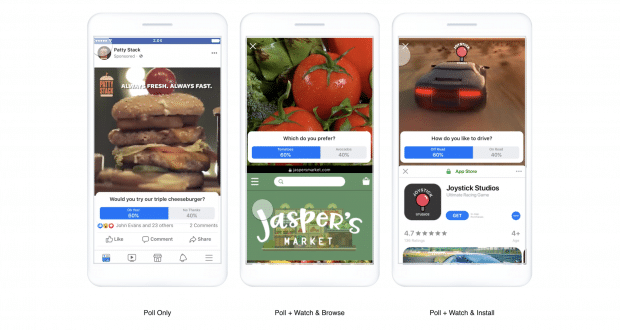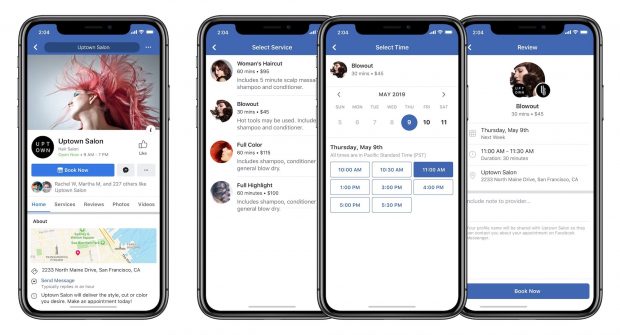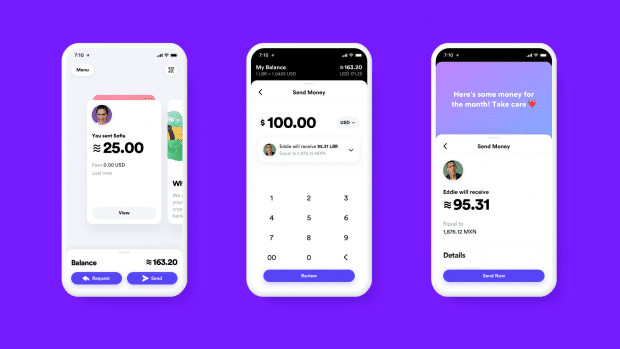As the first year of a new decade, 2020 is sure to be a big year for Facebook trends.
With the U.S. election in full swing, Facebook will continue to face public scrutiny when it comes to political ads. There will be more face offs with regulators when it comes to data privacy, too.
But Facebook has its own plans to shake things up as well. This year the platform plans to launch a fifth redesign of the platform, FB5. Libra, its cryptocurrency is due out in June. Innovation on the virtual and augmented reality front aim to keep ads interesting, too.
Without further ado, these are the top Facebook trends we’re watching now.
Looking for the most recent Facebook user demographics? Find them here.
9 of the most important Facebook trends to watch in 2020
Here are some of the Facebook trends you should have on your radar this year.
1. More shifts to private channels
At the annual F8 Developer conference last year, Mark Zuckerberg shared “A Privacy-Focused Vision for Social Networking.” And he doubled down on that vision at the beginning of this year.
“Our digital social environments will feel very different over the next 5+ years, re-emphasizing private interactions and helping us build the smaller communities we all need in our lives,” he said in an update on Facebook.
So, what does this mean? Expect Facebook to prioritize the private channels it already offers. That includes Facebook Messenger, Facebook Groups—and channels in its app family, such as WhatsApp and Instagram. Close Friends filters—like the one Instagram introduced, will likely show up more on Facebook, too.
Many brands have found success with private Instagram accounts. Facebook launched Groups for Pages in 2017, and last year the company let brand pages join Private Groups.
2. A group-centric redesign
Facebook has already started rolling out FB5, a “fifth version” of Facebook that will put Facebook Groups at the center of the platform.
The redesign was officially announced in April, but so far only a select few have been granted access to the new format. Some are already getting used to it.
Here’s what the redesign will look like:
- The Groups tab will get a new look aimed at making it easier to discover new groups.
- The Groups tab will feature a personalized feed that will show activity from all of the groups a member has joined.
- Group updates will also show up more often in the News Feed.
I’m excited to share the news today about a big launch we’ve been working on to put communities at the heart of Facebook. One of the best things about my job is hearing the amazing stories of what happens when people come together in Facebook Groups, whether it’s to bond over a common passion, learn something new, or support each other through a difficult time. That’s why I’m incredibly proud that we announced today that we’re rolling out FB5, Facebook’s fresh new design with new features that put communities at the center of the app. We’re launching a redesigned Groups tab with improved recommendations, new discovery tools and a faster way to navigate to, engage with and manage your groups. We’re making it easier to find and engage with groups across Facebook, from posting and sharing content directly to your groups from News Feed, to showing group recommendations relevant to what you’re doing across Facebook in Marketplace, Watch, Events and more. And we’re announcing new, unique features for different types of groups including “Health Support” groups, Buy and Sell groups, Gaming groups and Job groups. You can read more about the launch here: https://newsroom.fb.com/news/2019/04/f8-2019-day-1/ This video highlights many of the new features and shows the joy, support and connection happening in real Facebook groups across a huge diversity of topics. I often say “there’s a group for everyone on Facebook,” and the smiles and camaraderie in these examples show how true that is. We can do so much more together than we can alone.
Posted by Jennifer Dulski on Tuesday, April 30, 2019
There are already 1.4 billion people using Facebook Groups—400 million of whom say they belong to a group they find meaningful. Over 2020, Facebook will undoubtedly push to see these figures climb. Facebook will begin making group recommendations to users all across its platform, including in Marketplace, Today In, the Gaming tab, and Facebook Watch.
New features will also be introduced to support different communities. For example, Health Support groups will let people ask questions and share sensitive information anonymously. Gaming groups will have a new chat feature that lets members create threads for different topics. If successful, these features will find their way into other groups, too.
3. Upgrades to Messenger, with pivots to desktop
You read that right: Pivot to desktop.
Mobile still reigns supreme. In fact, when it comes to marketing, 94% of all ad revenue comes from mobile.
But Facebook has also started making small pivots to desktop. Last year at Facebook’s annual F8 Developer conference, the company announced the release of a desktop app for Messenger. While a beta version has appeared in some test markets, we’re still waiting for the full roll-out. Earlier this month, Instagram shared that it will also start testing direct messaging on desktop.
Messenger Desktop will have the same features as the phone app. Group video calls and collaboration features will be available in the new format, supporting the platform’s shift to private spaces.
These features sound awfully similar to the tools offered in Facebook Workplace. Look for a mishmash between TikTok story and Workplace collab add-ons this year.
In August, software engineer Jane Manchun Wong spotted that Facebook Messenger was also testing screen sharing for mobile.
Facebook Messenger is testing Screen Sharing for mobile
It’s like Watch Together but ascends beyond contents available on Facebook
I wrote a blog about this unreleased feature: https://t.co/NU8Tiw0xhK
Tip @Techmeme pic.twitter.com/Xcv3jOy4hp
— Jane Manchun Wong (@wongmjane) August 28, 2019

4. No more like counts?
In September last year, Facebook confirmed that it would test hiding like counts in Australia. The tests follow Instagram’s move to roll out private like counts globally after conducting trials.
According to Instagram, feedback has been mostly positive so far, which makes it all the more likely that likes will disappear from Facebook, too. Many Instagram trends find their way onto Facebook.
Facebook is working to hide like counts, too!https://t.co/WnUrM12aZg
Tip @Techmeme pic.twitter.com/TdT73wT6A0
— Jane Manchun Wong (@wongmjane) September 2, 2019
It’s still too early to say how this will or will not affect businesses on Facebook. When it comes to partnerships with influencers, it will no longer be possible to determine engagement rate by like count. In this case, brands will have to rely on the influencer to provide that information.
Here are all the different ways to calculate engagement rate.
5. AR and VR-driven ad formats
Facebook sees the digital ad space shifting further away from a static content model. Instead, the popularity of dynamic formats, like Stories, will continue to grow in importance for advertisers.
In support of this trend, Facebook made video poll ads for the mobile Feed globally available in September last year. Initial studies have had promising results. According to Facebook, in five out of nine lift studies, poll ads increased brand awareness when compared with video ads.

Facebook has also been expanding augmented reality opportunities for advertisers. As of December last year, advertisers can now create and publish their own AR effects for Facebook and Instagram ads with Spark AR Studios.
With Spark AR, brands can create filters and augmented experiences connected to packaging, displays, and more. AR shopping is already on Instagram, with MAC Cosmetics’ campaign with influencer Suede Brooks that lets people virtually “try on” lipstick shades before they buy them. Learn how to create Instagram AR filters here.
AR shopping has arrived. M·A·C Cosmetics is using Instagram Shopping’s Virtual Try-On feature, powered by Spark AR, to help influencers like Suede Brooks find their new favorite lipstick shade, and enhance the shopping experience for all mobile customers. Check it out!Virtual Try-on is currently in closed alpha phase, and will roll out to more brands in 2020.
Posted by Spark AR Creators on Wednesday, December 11, 2019
Facebook has also been dabbling with augmented reality games. For the launch of UK artist Liam Payne’s single “Stack It Up”, developer Aug It and Facebook Creative Shop teamed up to create four pinball game ads. The game, which people controlled via facial movements, could be played directly from the ad.
Expect to see more innovation in the playable ad format arena this year, especially as Facebook continues to make inroads in mobile gaming. The platform recently acquired cloud gaming service PlayGiga, and added two exclusive Pokemon Games to its Facebook Gaming offering.
Read our definitive guide to advertising on Facebook.
6. More support for small businesses
Instead of kicking off the new year with resolutions, Facebook’s chief Mark Zuckerberg shared a 10-year vision for the company. Helping small businesses is chief among his goals.
“Over the next decade, we hope to build the commerce and payments tools so that every small business has easy access to the same technology that previously only big companies have had,” he says. The number of small businesses using Facebook has grown from 90 to 140 million over the last 12 months.
It’s likely that, like last year, Facebook will release new tools for small businesses in May—just in time for National Small Business Week. Last year the company introduced Automated Ads, an appointment booking tool, and new editing tools for videos.

This year, look for more storefront-related features that will make it easier to shop and pay directly on the platform. It’s likely that more AI-driven automation and optimization will be in store for ads, too.
7. Ad-targeting headwinds and uncertainties
On the final earnings call of 2019, Facebook’s chief financial officer, David Wehner, noted that “ad-targeting-related headwinds and uncertainties” would be in store for 2020.
According to Wehner, there are three reasons for this. The first has to do with the changing regulatory landscape. He cites the European Union’s General Data Protection Regulation as an example. When it came out, many chose to opt out of letting Facebook use data from other websites and apps for ad targeting.
The second is related to Facebook’s push for a more private platform. With more private information and more private spaces, there could be less information available for targeting audiences.
Lastly, with the coming launch of Off Facebook Activity, Facebook users will have more control over the information they share with advertisers. People will now be able to see a summary of the information Facebook has collected about them off the platform, and decide if they’d like it removed from their account.
8. Mounting political pressure
As the 2020 U.S. election nears, Facebook faces even more scrutiny regarding its treatment of political ads and pages.
Already this year, Facebook executive Andrew Bosworth found himself in the news after an internal memo was leaked to the New York Times. He has since made the post public.
Facebook has added more controls and transparency for political pages and ads. One control even gives users the option to see fewer political ads. Others include a presidential campaign spend tracker and labels for political ads and state-controlled media.
We’re adding more information on who is behind a Page.
You’ll begin to see Pages’ “Confirmed Page Owner,” including an organization’s legal name and a verified city, phone number or website pic.twitter.com/arlZMKEgBg
— Facebook (@Facebook) October 21, 2019

The company has also partnered with YouGov in a bid to help fact checkers spot false claims more quickly. It also plans to introduce an Oversight Board for content moderation. It will likely begin hearing cases this summer.
Time will tell if these changes are enough to satisfy concerned voters, especially in the wake of Twitter’s bold ban of all political ads on its platform.
9. Potential launch of digital currency, Libra
Of all the Facebook trends for 2020, this one is the most mysterious.
If all goes according to plan, Facebook will launch Calibra, a digital wallet for its global cryptocurrency, Libra, by summer. The wallet is supposed to be released with Messenger, WhatsApp, and as a standalone app.

But, in October 2019, all U.S. payment processors, including PayPal, Visa, Mastercard, Stripe, and Mercado Pago dropped out of Facebook’s Libra Association. In December, a board member of the Libra Association told Reuters that the project did not have a solid plan for launch.
Zuckerberg’s 2030 vision make no note of Libra by name, but digital commerce and payment tools were mentioned.
Now that you’re familiar with the top Facebook trends for this year, try using Hootsuite to manage your brand’s Facebook presence. From a single dashboard you can schedule posts, share video, engage your audience, and measure the impact of your efforts. Try it free today.
Get Started
